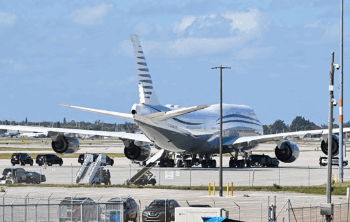A US federal judge on Thursday partially blocked President Donald Trump’s executive order aimed at overhauling the country’s voting system, dealing yet another legal blow to his administration’s efforts to enact sweeping electoral changes.
Judge Colleen Kollar-Kotelly ruled against a central component of the order, which required voters to provide proof of U.S. citizenship when registering to vote at the state level.
The executive order, signed at the end of March, set its sights on restricting mail-in voting, which Trump has criticised for years.
The order faced legal challenges as soon as it was signed, with the Democratic Party itself launching court proceedings against it.
Kollar-Kotelly justified enacting a preliminary injunction against Trump’s order by arguing that on further review of “the merits, the plaintiffs are substantially likely to prevail.”
“Our Constitution entrusts Congress and the States — not the President — with the authority to regulate federal elections,” she wrote in her 120-page decision.
Kollar-Kotelly declined to block another significant part of the executive order, which required states to impose a deadline for mail-in ballots coinciding with the close of polls on Election Day.
Though US citizenship is required to vote in federal elections, not all states require voters to bring documents attesting to their citizenship status, opting instead for other verification methods.
States that failed to comply with the executive order were threatened with having their federal election funding cut off.
Richard Hasen, a law professor at the University of California, Los Angeles has described the executive order as “dangerous” because it could “potentially disenfranchise millions of voters.”
In a March post on his Election Law blog, Hasen called Trump’s directive “an executive power grab,” and noted that “federal elections are largely the responsibility of the states, with Congress setting rules for the conduct of elections.”
Trump has never conceded defeat in the 2020 presidential election against Joe Biden, and has repeatedly and baselessly claimed widespread voter fraud.
Since his return to the White House on January 20, the 78-year-old Republican has issued dozens of executive orders, many of which have faced legal challenges.
As recently as Thursday, a judge blocked the Trump administration from withholding federal funds from so-called “sanctuary cities” that offer protective measures for migrants. (AFP)
What you should know
The decision by Judge Colleen Kollar-Kotelly is a major judicial check on President Trump’s attempt to centralize control over US elections, particularly through measures that critics argue could suppress voter turnout.
Her ruling blocks the requirement for proof of citizenship during voter registration, preserving states’ autonomy in managing elections.
While mail-in ballot restrictions remain intact for now, the case underscores a growing legal consensus that Trump’s executive actions may be overstepping constitutional limits.
The executive order is part of Trump’s broader efforts since his return to the White House to reshape voting regulations, often citing unproven claims of fraud from the 2020 election, which he lost to President Joe Biden.
Trump has refused to concede that loss, fueling a narrative that has influenced many of his policy decisions.
Legal experts like Richard Hasen argue that the order threatens to disenfranchise legitimate voters and undermines the federal structure of election governance.
With additional lawsuits pending against the order and growing judicial resistance, the Trump administration faces an uphill battle in redefining the electoral process.
The outcome of these legal challenges will likely shape how future administrations approach federal election authority.
ALSO READ TOP STORIES FROM VERILY NEWS


















